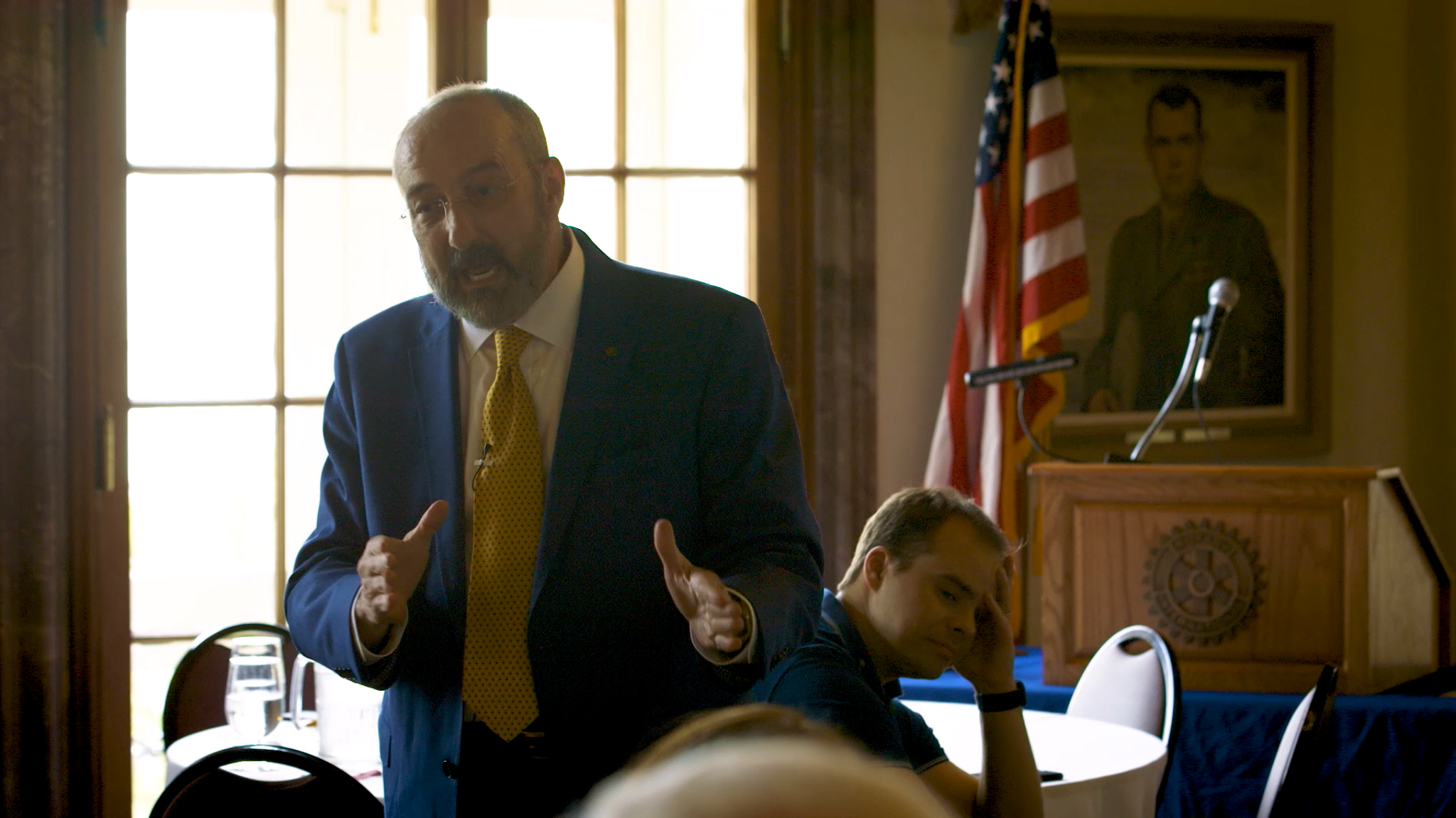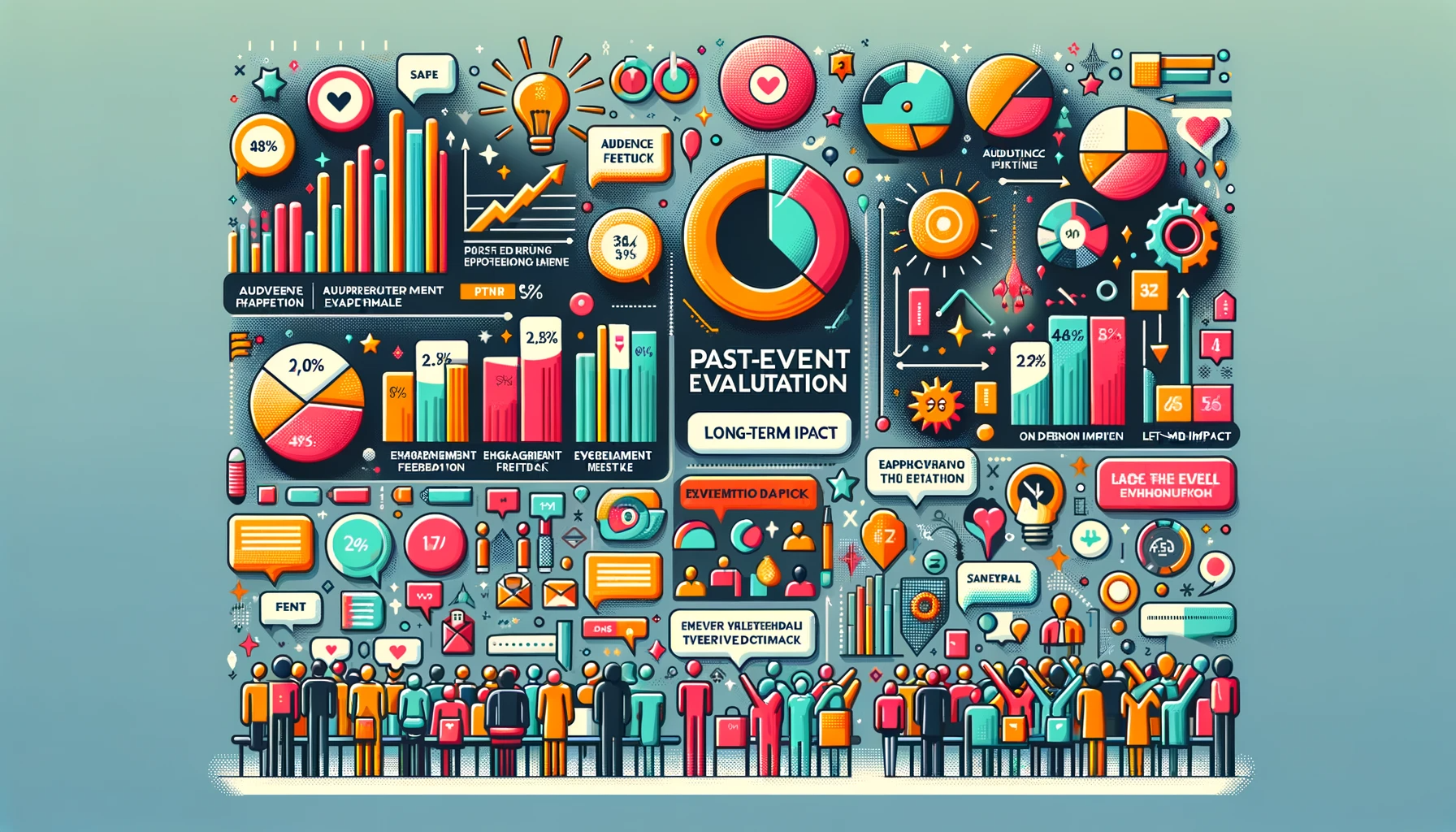Choosing the right keynote speaker can transform an ordinary event into an unforgettable experience. But where do you start?
BTW, if you are unsure what a keynote speaker is to begin with, check out this helpful guide ???? here.
This step-by-step guide on Keynote Speaker Selection will help you navigate through the process of finding the perfect match for your event.
Whether it’s a corporate conference, educational seminar, or any other gathering, selecting the right speaker is crucial.
The right speaker can inspire, educate, and engage your audience in ways that go beyond the ordinary.
How Do I Choose The Right Keynote Speaker?

Understanding the Role of a Keynote Speaker
Ever wondered what makes a keynote speaker crucial to an event’s success?
Let’s break it down:
- More Than a Presenter: A keynote speaker is the foundation of your event, setting the tone and delivering a message that resonates with every attendee. They ignite curiosity, provoke thought, and can drive change.
- Engagement Through Stories: Great keynote speakers captivate with stories that align with the event’s theme, reflecting the audience’s aspirations and challenges. They’re influencers who transform the atmosphere of the entire event.
- Connection with the Audience: These speakers excel in connecting through real-life experiences and insights, engaging everyone in the room. Their delivery, style, and presence turn ordinary presentations into memorable journeys.
- First Impressions Matter: It only takes 27 seconds for someone to form a first impression. This statistic is crucial for keynote speakers, as making a positive first impression can set the tone for the entire presentation and influence the audience’s receptiveness
- The Heartbeat of the Event: Remember, the right keynote speaker is the heartbeat of your event, turning an average experience into an extraordinary one. Choosing them is an investment in the success of your event.

Understanding the Importance of a Keynote Speaker
Have you ever wondered what makes a keynote speaker such an integral part of an event?
It’s not just about having someone famous or knowledgeable at the front of the room either, a keynote speaker holds the power to set the tone, influence the atmosphere, and leave a lasting impression on every attendee.
Let’s explore why a keynote speaker is so crucial:
- Setting the Tone: The keynote speaker is often the first voice your audience hears. This initial interaction is critical in establishing the event’s mood and energy. A captivating speaker can energize and engage the audience, making them more receptive to the messages that follow.
- Driving the Event’s Narrative: Your event tells a story, and the keynote speaker helps to unfold this narrative. They provide context, frame the theme, and can effectively connect various segments of your event, ensuring a cohesive experience.
- Influencing Audience Engagement: The right speaker can significantly impact how your audience engages with the event. They can encourage participation, foster a sense of community, and create an environment conducive to learning and interaction.
- Leaving a Lasting Impression: Often, the keynote speech is what attendees remember most. A powerful keynote can inspire long-term changes in attitude or behavior, making your event memorable and impactful.
Now, let’s dive deeper into each of these points:
Setting the Tone
The moment a keynote speaker takes the stage, they carry the responsibility of setting the event’s tone.
This is not just about their topic or expertise, but how they deliver their message.
The right speaker can infuse excitement, curiosity, and motivation right from the start. Imagine an early morning event, where attendees might still be groggy from their travel or routine.
A dynamic speaker can quickly transform this lethargy into enthusiasm, setting a positive tone for the rest of the day.
Driving the Event’s Narrative
A keynote speaker doesn’t just present; they connect the dots.
They help your audience understand the event’s overarching theme and how each part of the agenda contributes to this narrative.
For example, if your event is about innovation in technology, a speaker who can weave personal stories with industry trends can make the theme more relatable and engaging for the audience.
Influencing Audience Engagement
The influence of a keynote speaker on audience engagement cannot be overstated.
They have the unique ability to create a conversation, not just a monologue.
By asking thought-provoking questions, sharing relatable experiences, or even using interactive elements like polls or Q&A sessions, they can transform passive listeners into active participants.
This level of engagement is what makes an event not just informative, but transformative.
Leaving a Lasting Impression
The final, and perhaps most significant, role of a keynote speaker is to leave a lasting impression.
A compelling keynote can linger in the minds of attendees long after the event has concluded. It’s that one line, story, or idea that sticks with them, influences their thinking, or inspires action.
This lasting impact is what elevates a good event to a great one, making it a talking point for days, weeks, or even months to come.
In other words, the role of a keynote speaker goes far beyond just delivering a speech.
They are the tone-setters, narrative drivers, engagement facilitators, and lasting impression makers of your event.
Choosing the right keynote speaker is, therefore, not just a matter of filling a slot in your agenda; it’s about finding someone who can embody and elevate the very essence of your event.
In the following sections, we’ll explore how to analyze your audience, clarify your event objectives, and strategize effectively to select the perfect keynote speaker for your event.

Researching Potential Speakers
Identifying the perfect keynote speaker for your event can feel like a blend of art and science. It’s about meticulous research, keen observation, and sometimes, a bit of intuition.
But where do you start?
Here’s a step-by-step guide to navigating the research process, ensuring you find not just a good speaker, but the right speaker for your event.
Think of yourself as a detective, piecing together clues to uncover the ideal candidate.
Let’s explore how:
- Starting with an Online Search: The journey often begins with a simple online search. Look for speakers who are not only experts in your event’s theme but also have a track record of engaging presentations. Websites, professional directories, and speaker bureaus are good places to start.
- Watching Videos of Previous Talks: Videos can offer a real sense of a speaker’s style and effectiveness. Look for videos of their past talks, especially in settings similar to your event. Pay attention to how they interact with the audience and the response they receive.
- Reading Reviews and Testimonials: Feedback from those who have previously engaged the speaker can be incredibly insightful. Look for reviews or testimonials that speak to their impact, expertise, and ability to connect with an audience.
- Leveraging Your Network: Sometimes the best recommendations come through your professional network. Ask colleagues or industry peers for suggestions. They might know of hidden gems who could be the perfect fit for your event.
Diving into Online Research
Begin your quest with a thorough online search.
Websites like LinkedIn, speaker bureaus, and even YouTube can be treasure troves of information.
When searching, consider the relevance of their expertise to your event’s theme.
Are they thought leaders in the field?
Do they bring a unique perspective?
This initial search lays the groundwork for deeper investigation.
Watching and Analyzing Videos
Watching a speaker in action is invaluable.
Videos of their previous talks can reveal much about their speaking style and ability to engage an audience.
Look for how they open their talk, their body language, and how they handle audience questions.
This can give you a clear picture of how they might perform at your event.
Reading Reviews and Gathering Feedback
Reviews and testimonials offer a glimpse into past performances and audience reactions. Look for patterns in the feedback.
Are there consistent praises or concerns?
This feedback can be found on professional websites, social media, or even by directly contacting organizations where they’ve spoken before.
Utilizing Your Professional Network
Don’t underestimate the power of word-of-mouth.
Reach out to your professional network for recommendations.
Sometimes, the most suitable speakers are those who have positively impacted your peers and come with a trusted endorsement.
In conclusion, researching potential keynote speakers is a comprehensive process that demands attention to detail and a strategic approach.
It’s about piecing together various sources of information to create a holistic view of each candidate.
By following these steps, you will be well-equipped to make an informed decision, ensuring your event is both memorable and impactful.

Evaluating Speaker Credentials
After your diligent research to find potential keynote speakers, the next critical step is evaluating their credentials.
Think of this stage as being a judge in a talent show, where you meticulously assess each candidate to ensure they are the best fit for your event.
This process is key to ensuring that your chosen speaker not only adds value but also resonates with your audience and event’s objectives.
Here’s a comprehensive approach to evaluating a speaker’s credentials:
- Assessing Relevant Expertise: First and foremost, ensure that the speaker has expertise in the subject matter relevant to your event’s theme. Their background, qualifications, and area of specialization should align with your event’s focus.
- Reviewing Speaking Experience: Experience in speaking at similar events can be a strong indicator of a speaker’s ability. Look for their history in events of similar size, audience type, and industry. This experience often translates into a greater ability to connect with and engage your audience.
- Understanding Style and Presence: Every speaker brings a unique style and presence to the stage. Consider how their speaking style – whether it be motivational, educational, or entertaining – matches the tone and energy you envision for your event.
- Valuing Audience Feedback: Feedback from previous audiences can provide valuable insights into the speaker’s effectiveness. Look for comments on how the speaker was received, what the audience took away from their talk, and how well they connected with the audience.
Diving into Relevant Expertise
Expertise is more than just being knowledgeable; it’s about having a deep understanding and insight into the topic. A speaker with relevant expertise can offer fresh perspectives and insights, making their contribution to your event both meaningful and credible.
Reviewing Speaking Experience
Experience matters. A speaker who has addressed similar audiences or events can navigate the nuances and dynamics of your event with ease. Their experience can also be an indicator of their professionalism and ability to handle unexpected situations during an event.
Understanding Their Style and Presence
A speaker’s style and presence can set the tone for your entire event. Do you want someone with a dynamic, high-energy style, or someone more reflective and thought-provoking? Aligning the speaker’s style with the desired atmosphere of your event is crucial for its overall success.
Valuing Audience Feedback
Past audience feedback is a treasure trove of information.
It gives you a glimpse into how well the speaker was able to engage with the audience and the impact they had.
Positive feedback, especially recurring themes in the reviews, can be a strong indicator of a speaker’s effectiveness.
It’s important to remember these tips when evaluating a speaker’s credentials.
This is a vital step in your selection process.
It requires a balance of understanding their expertise, experience, style, and audience reception.
By being thorough in this evaluation, you ensure that the speaker you choose aligns perfectly with your event’s needs, contributing to its overall success and impact.

Speaker Engagement and Interaction Techniques
Engaging the audience is a keynote speaker’s superpower.
It’s what turns a speech into a memorable experience.
Here are some techniques to ensure your speaker can effectively interact with the audience:
- Encourage Storytelling: Stories connect speakers with their audience on a personal level. Encourage your speaker to share relevant anecdotes and experiences.
- Q&A Sessions: Allocate time for a question-and-answer segment. It allows the audience to interact directly with the speaker and deepens their engagement.
- Audience Participation: Techniques like polls, show of hands, or interactive activities can make the audience feel like a part of the presentation.
- Use of Visual Aids: Effective use of slides, videos, or props can enhance the speaker’s message and maintain audience interest.
Remember, the goal is to create a two-way conversation between the speaker and the audience.
This interaction is what makes an event truly impactful and memorable.

Incorporating Speaker Feedback into Event Planning
Feedback is a goldmine for improving future events. It’s like having a roadmap that guides you to better choices and strategies.
Here’s how to effectively use speaker feedback:
- Collect Detailed Feedback: Use feedback forms or surveys to gather detailed comments and ratings from attendees about the speaker’s performance.
- Analyze and Identify Trends: Look for common themes in the feedback. What did the audience love? What could be improved?
- Engage with the Speaker: Share this feedback with the speaker. It can be invaluable for their professional growth and future presentations.
- Apply Lessons Learned: Use the insights gained to make informed decisions in selecting and briefing future keynote speakers.
Remember, each piece of feedback is an opportunity to learn and enhance the quality of your events.
Embracing this feedback loop is key to continuous improvement and success.

Leveraging Social Media and Marketing with Your Keynote Speaker
Integrating your keynote speaker into your event’s marketing and social media strategy can significantly amplify your event’s reach and impact.
Here’s how to do it effectively:
- Highlight Speaker Strengths: Tailor your social media content to showcase the unique strengths and expertise of your keynote speaker. This could include sharing their past achievements, notable speeches, or contributions to their field.
- Interactive Content: Create interactive social media posts, such as live Q&A sessions, polls, or contests related to your speaker’s topics. This encourages audience participation and increases engagement.
- Behind-the-Scenes Moments: Share behind-the-scenes glimpses of your speaker preparing for the event or engaging in event-related activities. This adds a personal touch and builds anticipation.
- Collaborative Promotion: Work closely with the speaker to co-create content. This could include joint videos, interviews, or live social media takeovers where the speaker shares their insights directly with your audience.
- Teasers and Highlights: Post teasers of the speaker’s content, such as key points from their upcoming speech or exciting topics they will cover. After the event, share highlights or memorable quotes to keep the conversation going.
- Consistent Updates: Regularly update your social media channels with information about the speaker and the event. Consistency keeps your audience informed and engaged as the event approaches.
By leveraging the speaker’s presence in your marketing efforts, you can create a stronger and more engaging narrative around your event, attracting a wider and more engaged audience.

Post-Event Evaluation: Measuring the Impact of Your Keynote Speaker
After your event concludes, it’s crucial to measure the impact your keynote speaker had.
This is like checking the pulse of your event’s success.
Here’s how to effectively evaluate their impact:
- Analyze Audience Feedback: Gather and review feedback from attendees regarding the speaker’s performance. Look for comments on how the speaker influenced their event experience.
- Engagement Metrics: Review engagement metrics such as session attendance, audience participation during the session, and social media interactions.
- Overall Event Success: Assess how the speaker contributed to the overall goals of the event, like knowledge sharing, networking, or entertainment.
- Long-term Impact: Consider any longer-term effects, such as increased interest in future events or sustained discussions about the topics presented.
By thoroughly evaluating these aspects, you gain valuable insights for future event planning and speaker selection, ensuring continuous improvement and success.

Building Long-Term Relationships with Keynote Speakers
Establishing ongoing relationships with keynote speakers can bring lasting benefits to your events.
Think of it as nurturing a garden; the more you care for it, the more it flourishes.
Here’s how to build these relationships:
- Provide Valuable Feedback: Share constructive feedback with the speaker after the event. This shows that you value their contribution and are invested in their growth.
- Stay in Contact: Regular communication, even when you’re not planning an event, helps maintain the relationship. Occasional emails or social media interactions can keep the connection alive.
- Repeat Engagements: Consider inviting speakers back for future events. This not only strengthens the relationship but also builds continuity for your audience.
- Networking Opportunities: Offer opportunities for speakers to network with other professionals at your events. This adds value to their experience and can lead to further collaborations.
Building a long-term relationship with keynote speakers is a strategic move.
It creates a pool of trusted, reliable speakers who understand and align with your event’s ethos, ensuring consistent quality and engagement for your future events.

Conclusion
We’ve navigated through the comprehensive process of selecting the perfect keynote speaker for your event.
Let’s recap the key steps:
- Understanding the Role: Recognizing the transformative power of a keynote speaker in setting the event’s tone.
- Identifying Needs: Aligning the speaker with your event’s theme, audience, and goals.
- Researching Speakers: Conducting thorough research to find potential candidates.
- Evaluating Credentials: Assessing the speaker’s expertise and compatibility with your event.
- Leveraging Marketing: Using social media and marketing strategies to enhance your event’s reach.
- Post-Event Evaluation: Measuring the speaker’s impact on your event’s success.
- Building Relationships: Establishing lasting connections with speakers for future events.
This guide is designed to empower you, whether you’re a seasoned planner or a newcomer, with the knowledge to select a keynote speaker who elevates your event.
Remember, the right speaker can transform an ordinary event into an extraordinary experience.

